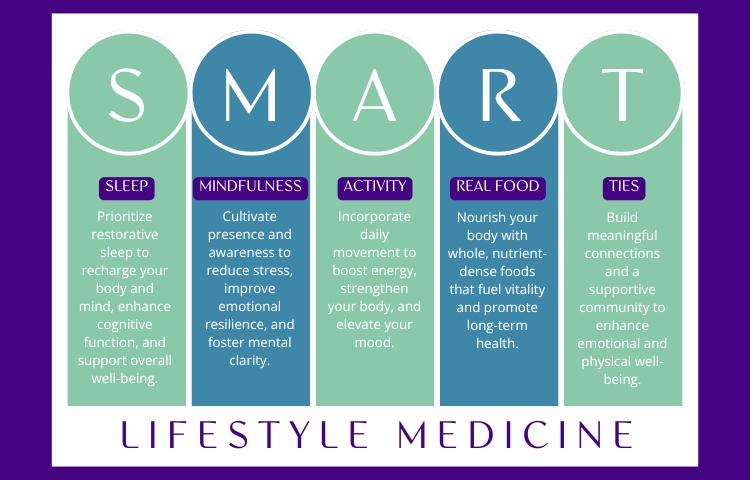A few weeks ago, I introduced the SMART Lifestyle framework in my blog Living SMART: The Importance of Lifestyle Medicine. This approach is designed to provide a structured yet flexible foundation for improving overall well-being through Sleep, Mindfulness, Activity, Real Food, and Ties.
In this series, we’re diving deeper into each pillar, starting with the essential role of sleep. With everything pulling us in different directions, prioritizing your health can feel overwhelming.
That’s why I created the SMART Lifestyle framework—a practical and personalized approach to long-term well-being. SMART stands for Sleep, Mindfulness, Activity, Real Food, and Ties, five key elements that support overall health.
In this series, we’ll explore the science behind each pillar, starting with the foundation of good health—sleep.

Why Sleep Matters for Health and Longevity
Sleep isn’t just about feeling rested—it plays a vital role in regulating brain function, metabolism, immune strength, hormone balance, and cardiovascular health. Without enough quality sleep, the body experiences ongoing stress, which increases inflammation and raises the risk of chronic conditions like heart disease, diabetes, and memory problems.
Research has shown that lack of sleep weakens immune function, slows the brain’s ability to clear toxins, disrupts hormonal rhythms, and elevates stress hormones, all of which make it harder to maintain overall health. Poor sleep patterns over time are linked to an increased risk of neurodegenerative conditions, metabolic imbalances, and even some types of cancer.
How Sleep is Regulated
Our sleep cycle is orchestrated by a complex interplay of hormones and brain signals that follow a daily rhythm. Melatonin, a key hormone produced in response to darkness, helps signal bedtime. GABA, a neurotransmitter, promotes relaxation and helps us transition into deeper sleep stages, while adenosine accumulates throughout the day to build sleep pressure. In contrast, cortisol naturally decreases at night, but when stress levels are high, it remains elevated and interferes with sleep quality.
Interestingly, research on pre-industrial societies suggests that while they may have slept for only 5.5 to 7 hours per night, the absence of artificial light exposure resulted in deeper, more restorative sleep. This suggests that sleep quality and the alignment with natural darkness may be just as important as sleep duration itself (Yetish et al., 2015).
Practical Strategies for Better Sleep
Optimizing sleep is about more than just getting enough hours—it’s about improving consistency, reducing stress, and creating an environment that encourages deep, restorative rest. One of the most effective ways to enhance sleep quality is by exposing yourself to natural sunlight in the morning. This helps regulate your circadian rhythm and ensures melatonin production is in sync with your body’s natural clock.
In the evening, avoiding screens and bright artificial lights is crucial. Blue light exposure suppresses melatonin, making it harder to fall asleep. Creating a calming nighttime routine, such as reading, meditation, or stretching, can also help signal to your body that it’s time to wind down. Eating too close to bedtime can disrupt digestion and sleep patterns, so finishing your last meal at least three hours before bed is a good practice.
Stress management plays a major role in sleep quality. High levels of cortisol at night can lead to fragmented sleep and difficulty reaching deep sleep stages. Techniques such as meditation, breathwork, or even acupuncture can help reduce nighttime stress. Nutrients like magnesium and amino acids that support GABA production can further enhance relaxation.
The sleep environment itself matters, too. A cool, dark bedroom signals to the body that it’s time to rest. Research suggests that keeping the temperature between 65 and 68°F (15.6–20°C) helps promote deeper sleep. Something as simple as wearing socks at night may also help by lowering core body temperature, a physiological trigger for sleep onset.
If tracking your sleep helps with accountability, wearable technology like the Oura Ring can provide insights into sleep patterns, total sleep time, and how lifestyle factors impact sleep quality.
Final Thoughts & What’s Next
Sleep is one of the most fundamental lifestyle factors influencing energy, mood, and long-term health. If you’re struggling with fatigue, brain fog, or stress, prioritizing sleep can be a powerful first step toward improving well-being.
In the next part of the SMART Lifestyle series, we’ll explore Mindfulness—how calming the mind can improve overall health.
Ready to take the next step in your health journey? Book a free consultation withme today and discover personalized, integrative solutions for your well-being. Schedule here.
Stay tuned!
Dr. Andrew Wong
Sources:
- Brain Basics: Understanding Sleep. National Institute of Neurological Disorders and Stroke.
- Davinelli et al., Sleep and Oxidative Stress: Current Perspectives on the Role of NRF2, Cellular and Molecular Neurobiology, 2024.
Yetish et al., Natural Sleep and Its Seasonal Variations in Three Pre-industrial Societies, Current Biology, 2015.




0 Comments